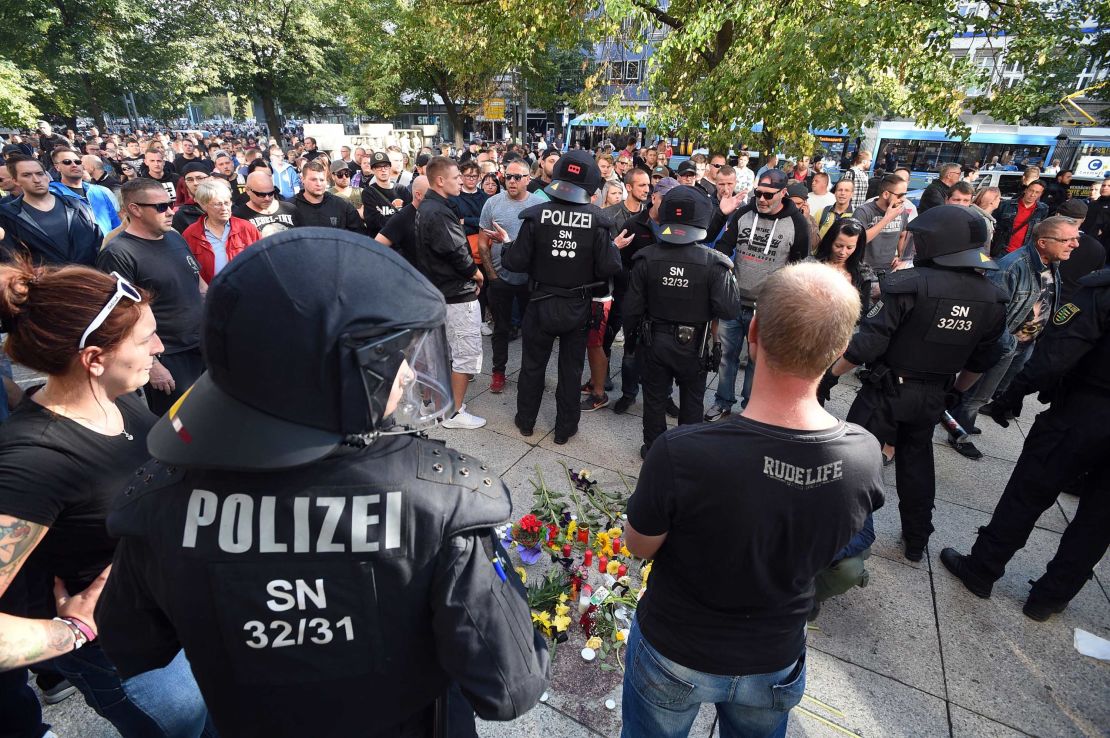The German government condemned attempts to “spread hatred on the streets” after a violent demonstration Sunday in Chemnitz, eastern Germany, where protesters called for foreigners to leave the city.
Police admitted being unprepared for the scale of the protests, which took place after a 35-year-old man died from injuries sustained in a fight.
Footage posted on social media shows participants clashing with police and shouting “Foreigners get out,” “This is our city” and “We are the people,” a phrase used 30 years ago to call for the reunification of East and West Germany, but now frequently heard at far-right gatherings to express anti-immigrant sentiment.
In one video, two men are seen chasing after someone they believed was an immigrant.
About 800 people took part in Sunday’s protest, police said, with around 50 of them encouraging violence. The demonstration, which took place on the final afternoon of the city’s summer festival, was called only a few hours earlier, and police initially did not have enough officers available. Extra officers were called in from the nearby cities of Leipzig and Dresden to deal with the incident.
The protesters moved quickly from their meeting point into the city center, according to police, some throwing bottles at police officers.
“This has no place in our country,” said government spokesman Steffen Seibert on Monday. “Such targeting and hunting of people with different looks, different origins, or the attempt to spread hatred on the streets has no place in our cities.”

Far right party called for protest
The protest was triggered by the death of a 35-year-old man following a fight between multiple people in central Chemnitz in the early hours of Sunday morning, according to police. Two other men were seriously injured in the fight.
The public prosecutor said Monday that two men – a 23-year-old Syrian citizen and a 22-year-old Iraqi citizen – are being investigated for suspected murder.
Authorities had previously released no information about the nationality of the two suspects, but speculation quickly spread across parts of social media on Sunday that migrants were to blame for the man’s death and a number of calls to action were issued.
The local branch of Germany’s far-right Alternative for Germany (AfD) party responded by calling for a “spontaneous demonstration” in memory of the victim, posting a picture on Facebook of a blood-spattered pavement.
AfD lawmaker Markus Frohnmaier also called for action, saying it was a “civic duty to stop this deadly ‘knife migration.’”
“If the state cannot protect its citizens, people will take to the streets and protect themselves,” he wrote on Twitter.
Around 100 people gathered for the AfD protest, due to start at 3 p.m. They soon dispersed but were replaced by a crowd of around 800, police said, adding that the group refused to cooperate with attempts by the authorities to calm the situation.
Following the march to the city center and a vigil at the spot where the fight had taken place earlier, the crowd gradually broke up and moved away, police said.
Mixed response from AfD
Speaking at a news conference on Monday, Siegbert Droese, an AfD member of the Bundestag for the nearby city of Leipzig, denied his party was responsible for the protest and said the AfD was “appalled” by the events.
But a second AfD politician, Tino Chrupalla, appeared to defend the call to action.
“Chemnitz is among the list of cities considered the most dangerous in the country,” he said. “Families can’t even feel safe in going to the state festival anymore… We call upon our voters to do something about this.”
The AfD, which campaigned on an anti-immigration, anti-Islam platform, won more than 25% of the vote in the state of Saxony – where Chemnitz is located – in last September’s federal election, almost double the national average.
Further right-wing demonstrations were planned for later on Monday. Left-wing and anti-racism groups were also urging their supporters to take to the streets of Chemnitz for a counter-protest.
Police said Monday that the city was “well prepared” for any upcoming protests.
CNN’s Atika Shubert and Nadine Schmidt reported from Berlin. Judith Vonberg wrote in London.




